
-
Find the right food for your petTake this quiz to see which food may be the best for your furry friend.Find the right food for your petTake this quiz to see which food may be the best for your furry friend.Featured productswith Chicken, with Beef
Hill's Science Plan Puppy Multipack Wet Dog Food with Chicken & Beef are complete premium pet foods for growing puppies from weaning until 1 year old and for pregnant and nursing dogs. Your puppy will love these deliciously smooth and savoury minced loaves, formulated for balanced nutrition and overall health.
Shop Nowwith Chicken, with BeefHill's Science Plan Mature Adult Multipack Wet Dog Food with Chicken & Beef are complete premium pet foods for mature adult dogs from 7 years. Your dog will love these deliciously smooth and savoury minced loaves, formulated to deliver the appropriate amount of energy to support the needs of adult dogs.
Shop NowAdult Dog FoodHill's Science Plan Adult Multipack Wet Dog Food with Chicken, Beef & Turkey are complete premium pet foods for adult dogs from 1 year. Your dog will love these deliciously smooth and savoury minced loaves, formulated for balanced nutrition and overall health.
Shop NowFeatured products Mature Adult Wet Cat Food with Chicken
Mature Adult Wet Cat Food with Chicken
Tender chicken chunks in gravy for mature adult cats. Made with easy-to-digest ingredients, high-quality protein for lean muscle maintenance and antioxidant vitamins C+E for optimal health.
Shop Now with Ocean Fish, Chicken
with Ocean Fish, ChickenTender chicken chunks in gravy for cats, with L-carnitine and fewer calories for ideal weight management. Packed with high-quality protein, omega-6s, and vitamin E for shiny fur and healthy skin.
Shop Now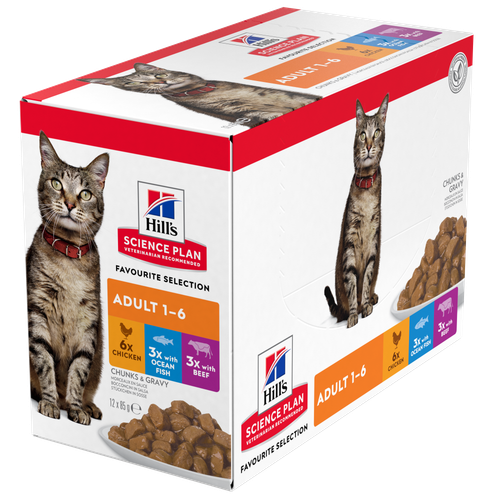 Adult Wet Cat Food with Chicken
Adult Wet Cat Food with ChickenTender chunks in gravy for cats, with high-quality protein to maintain lean muscle. With vitamin E and omega-3s & -6s for healthy skin and balanced minerals to support healthy vital organs.
Shop Now -
Dog
- Dog Tips & Articles
-
Health Category
- Weight
- Food & Environmental Sensitivities
- Urinary
- Digestive
- Joint
- Kidney
-
Life Stage
- Puppy Nutrition
- Adult Nutrition
- Senior Nutrition
Cat- Cat Tips & Articles
-
Health Category
- Weight
- Skin & Food Sensitivities
- Urinary
- Digestive
- Kidney
-
Life Stage
- Kitten Nutrition
- Adult Nutrition
Featured articles Show some love with wet foods: a great choice for pets with health issues
Show some love with wet foods: a great choice for pets with health issuesShow some love with wet foods: a great choice for pets with health issues.
Read More The Incredible Science Behind Your Pet's Microbiome
The Incredible Science Behind Your Pet's MicrobiomeLearn what your pet's microbiome is, how it contributes to your pet's gut and overall health, and why nutrition is important in maintaining healthy microbiomes.
Read More The Right Diet For Your Pet
The Right Diet For Your PetIn people, the right diet is very important. If you are eating the wrong way for your metabolism, activity level, age and lifestyle you could end up with health issues.
Read More -
Stress in cats
Stress in cats
What causes stress in cats?
While GI or urinary issues are noticeable, cats are likely also experiencing stress hiding in plain sight. There are multiple factors that can cause stress.
- Changes in the home environment
- Inconsistency in routine
- Underlying health condition or pain
- Boredom
- Mishandling
- Adversarial relationships with other pets
- Noisy events
Be sure to monitor your cat’s behavior and note any changes to discuss with your vet if you suspect your cat is stressed.

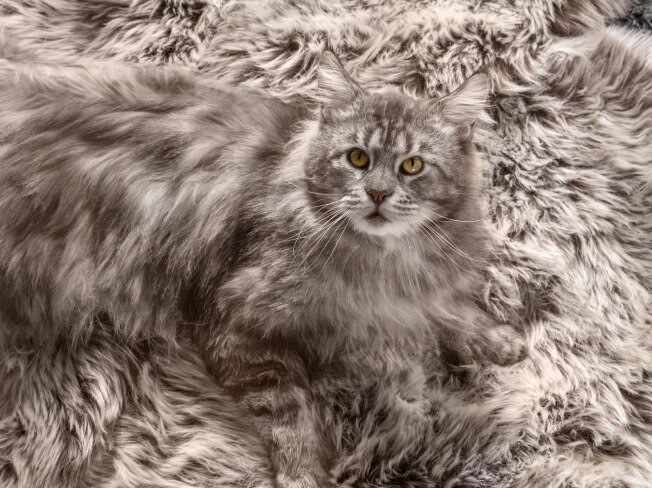
What are the hidden signs of stress?
Even when the signs are visible, it’s easy to overlook a pet’s hidden stress. Urinary signs are the most noticeable of hidden stress signs, so you might be wondering if your cat is stress peeing or if stress can cause urinary problems. If you notice any of these signs, it’s important to make an appointment with your veterinarian.






Managing your pet’s stress
If you suspect your cat is stressed, the first step should be a visit to your veterinarian. They can provide you with guidance and information about how to manage stress in cats. Along with information, they may recommend nutrition or medication to help manage your cat’s stress.
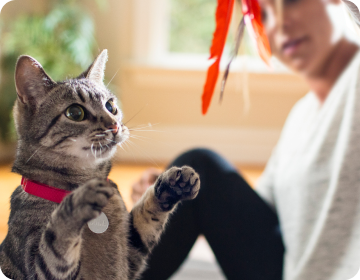

At home
Providing your cat with consistency can help alleviate some stress. Here are some tips to help keep your cat calm at home:
- Always provide clean litter trays and plenty of fresh water. Don't forget to keep litter trays and food in separate areas
- In multi-cat households, provide enough food, water and litter trays for each cat
- Create a playground to keep them entertained and satisfy their urge to scratch
- Pay attention to their body language before touching or handling them
- Cats love to climb up high, help them reach new heights and find a window seat where they can watch the world outside
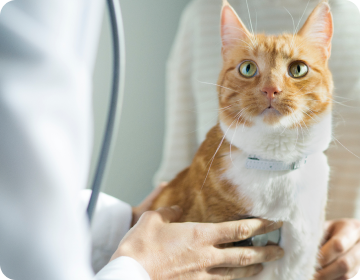

Medication
In addition to behavioural and environmental accommodations, a vet may prescribe medication to help manage your cat’s stress. If you are looking for medications to give your cat, consult with your vet first. Over-the-counter medications should only be used as recommended by your vet.
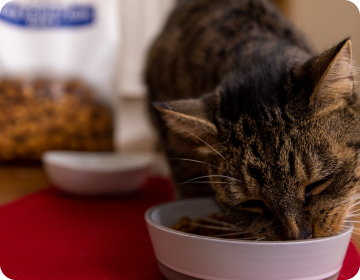

Nutrition
Ask your vet for a nutritional recommendation that can help manage signs of emotional imbalance to improve the quality of life for cats.
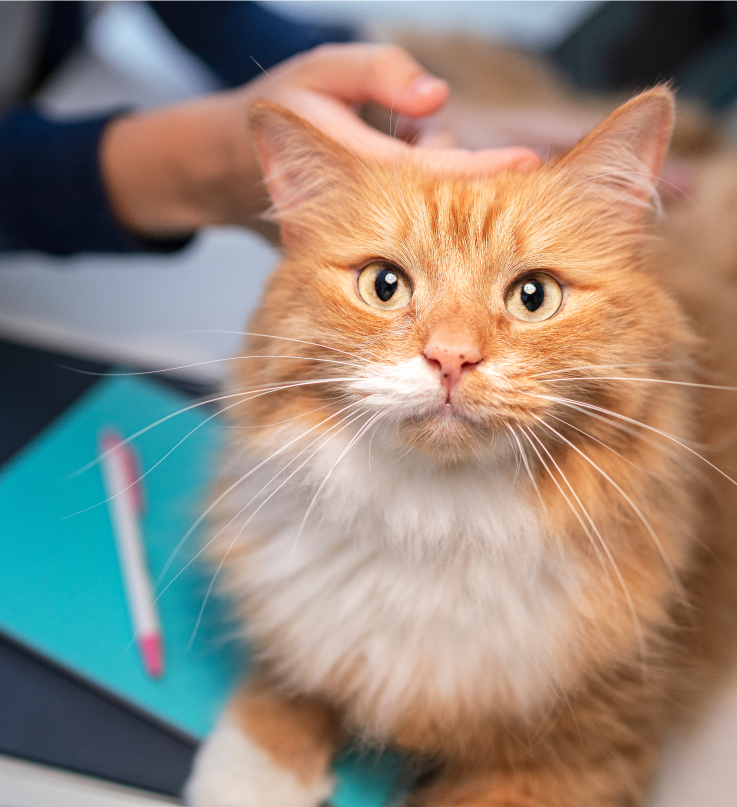

Finding the right nutrition to help manage emotional balance
A veterinarian may recommend clinical nutrition as part of a comprehensive treatment plan to help manage a cat’s stress. The right blend of ingredients can make a visible difference in pets experiencing emotional imbalance.
Ingredients shown to control stress
- L-tryptophan is an ingredient that can help support emotional balance.
- Milk protein hydrolysate decreases fearfulness & increases contact with people¹
- Omega-3s & antioxidants help support the body’s response to stress
¹Beata et al. J Vet Behavior 2007;2:40-46
2Meyer HP, Becvarova I. Effects of a urinary food supplemented with milk protein hydrolysate and L-tryptophan on feline idiopathic cystitis - results of a case series in 10 cats. Intern J Appl Res Vet Med 2016;14:59-65.
3Beata et al. J Vet Behavior 2007;2:40-46.
Ask your vet for a recommendation
Hill's Prescription Diet foods offer clinical nutrition for a range of health conditions. They're clinically tested and developed by a team of PhD nutritionists and veterinarians, so you can rest assured that your pet is receiving premium nutrition backed by science.
Schedule an appointment with your vet and ask how Hill's Pet Nutrition can help.
Ask your vet for a recommendation
Hill's Prescription Diet foods offer clinical nutrition for a range of health conditions. They're clinically tested and developed by a team of PhD nutritionists and veterinarians, so you can rest assured that your pet is receiving premium nutrition backed by science.
Schedule an appointment with your vet and ask how Hill's Pet Nutrition can help.
More products

Hill’s Prescription Diet Gastrointestinal Biome is a high-fiber wet cat food clinically shown to promote regular healthy stool in as little as 24 hours and help reduce risk of recurrence. Fortified with ActivBiome+ Ingredient Technology to rapidly activate the gut microbiome and help manage complex GI issues.
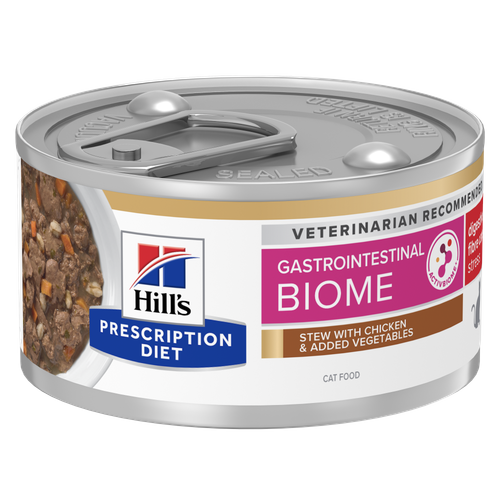
Hill’s Prescription Diet Gastrointestinal Biome is a high-fiber wet cat food clinically shown to promote regular healthy stool in as little as 24 hours and help reduce risk of recurrence. Fortified with ActivBiome+ Ingredient Technology to rapidly activate the gut microbiome and help manage complex GI issues.
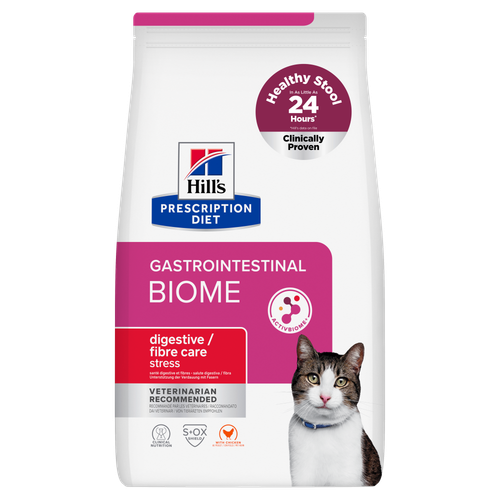
Hill’s Prescription Diet Gastrointestinal Biome is a high-fibre dry cat food clinically shown to promote regular healthy stool in as little as 24 hours and help reduce risk of recurrence. Made with ActivBiome+ Ingredient Technology to rapidly nourish the gut microbiome and help manage complex GI issues.
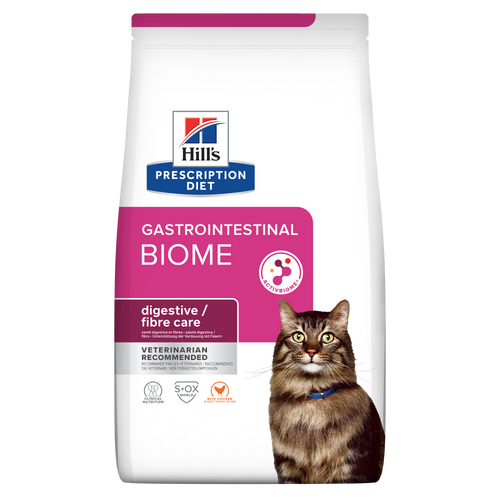
Hill’s Prescription Diet Gastrointestinal Biome is a high-fibre dry cat food clinically shown to promote regular healthy stool in as little as 24 hours and help reduce risk of recurrence. Made with ActivBiome+ Ingredient Technology to rapidly nourish the gut microbiome and help manage complex GI issues.
Related Articles
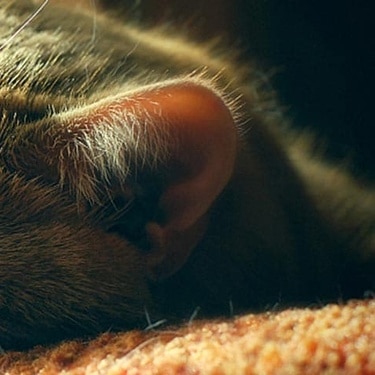
Learn to recognise the signs of anxiety and stress in cats and understand the potential causes. Get expert tips on managing stress with Hill's Pet UK.
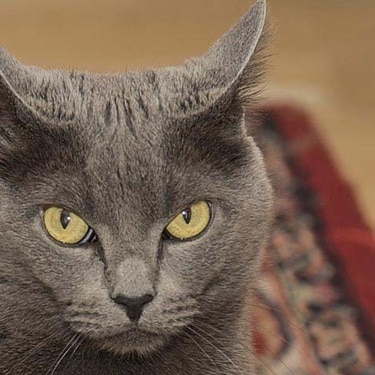
Understand the symptoms and common causes of cat urinary problems, including how to spot the signs of urinary issues. Get expert advice at Hill's Pet UK.
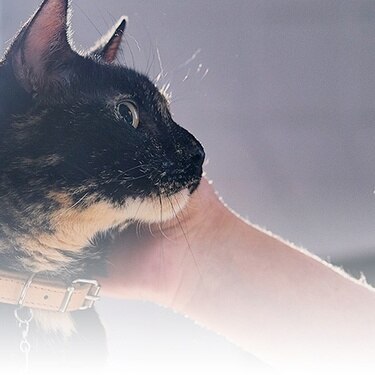
It's not uncommon for a cat to be afraid of loud noises, especially thunder and fireworks.
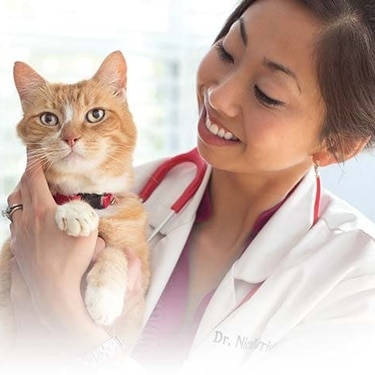
As any caring cat owner knows, a routine visit to the vet is anything but routine. Regular examinations are the right thing to do, but try telling that to your cat.

